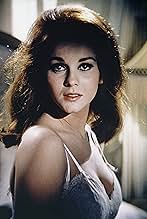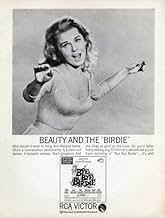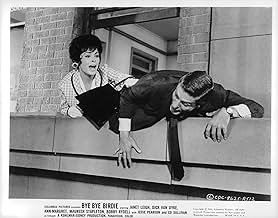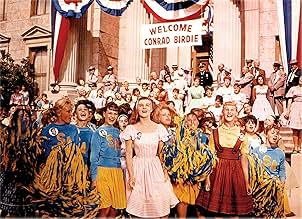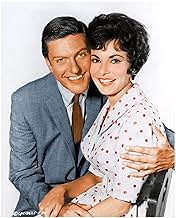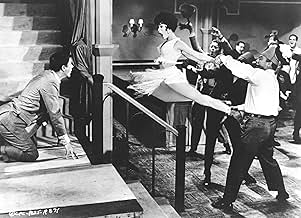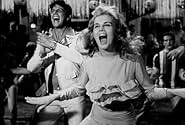AVALIAÇÃO DA IMDb
6,6/10
9,6 mil
SUA AVALIAÇÃO
Adicionar um enredo no seu idiomaA rock singer travels to a small Ohio town to make his "farewell" television performance and kiss his biggest fan before he is drafted.A rock singer travels to a small Ohio town to make his "farewell" television performance and kiss his biggest fan before he is drafted.A rock singer travels to a small Ohio town to make his "farewell" television performance and kiss his biggest fan before he is drafted.
- Indicado a 2 Oscars
- 7 indicações no total
- Direção
- Roteiristas
- Elenco e equipe completos
- Produção, bilheteria e muito mais no IMDbPro
Enredo
Você sabia?
- CuriosidadesThe steps of the courthouse used for Birdie's welcome to Sweet Apple have appeared in countless movies over the decades. A major part of Universal's backlot, it was the location of Scout's and Jem's several visits in O Sol é para Todos (1962), as well as the famous courthouse clock in De Volta para o Futuro (1985). The town square it anchors was so popular that it was used by hundreds of film and television shows, including many that were not produced by Universal.
- Erros de gravaçãoAfter Rosie pulls the McAfee family out of the audience at Toast of the Town (1948), two different shots of the Russian conductor show the McAfees still sitting in the audience.
- Citações
Rose DeLeon: I must be the prized dope of all-time... thinking I could pry you away from your mama's ever-lovin' tentacles.
- Cenas durante ou pós-créditosThere is no "The End" credit or cast list at the end of the film. Ann-Margret simply sings an on-screen reprise of the song "Bye Bye Birdie" at the end, and then says " 'Bye, now!".
- ConexõesEdited into Histoire(s) du cinéma: Seul le cinéma (1994)
- Trilhas sonorasBye Bye Birdie
Music by Charles Strouse
Lyrics by Lee Adams
Performed by Ann-Margret before the title credits, with Johnny Green and the Columbia Studio Orchestra and Chorus
Reprised by Ann-Margret in the finale
Avaliação em destaque
I am usually in the corner of those who complain about how Hollywood generally altered many classic Broadway stage musicals into something radically different when they were made into movies. Most of the time, the changes were ridiculous and weakened the property dramatically.
"Bye Bye Birdie" though, is the rare exception where the changes made to get it to the big screen were absolutely necessary. And nothing demonstrates this more than the fact that the faithful 1995 TV version is a lumbering, slow-moving mess that manages to demonstrate perfectly how what plays great on the stage does not always translate effectively to the film medium.
By contrast, the 1963 film version decided to make itself a bright, colorful film extravaganza that played to the strengths of the film medium. And the results in my opinion, worked wonderfully.
To a stage fan like "citybuilder" who rips the changes from the play, he needs to stop and think of how the structure of the stage version, which has the Sullivan show moment and the punching of Conrad as an Act I finale, would never have worked on film. It simply makes more cinematic sense to move that to the end. And the whole big deal over Rose's ethnicity, which was really done to showcase the talent of Broadway lead Chita Rivera, would have been a distraction as well because spotlighting Albert's mother as a racist would have gone against the whole tone of the movie (and truth be told "Spanish Rose" is not that great a song). Likewise, it's better to have Albert sing "Put On A Happy Face" to Rose rather than a nameless Conrad Birdie fan we never see again.
Dick Van Dyke and Paul Lynde offer the right amount of gravitas from the Broadway cast, Janet Leigh in her black wig gets to show off her dancing talent which she seldom got a chance to do (her singing is admittedly a bit thin, but she gets by), and of course Ann-Margret totally elevates the role of Kim McAfee into a star vehicle, and who can blame them for doing this? Her rendition of the title song written for the film is enough to leave one gasping for air, yet she still manages to be convincing as the wide-eyed teenager just the same.
Ultimately, stage fans can be satisfied that they got the version they prefer done on film (though it should be noted that the 95 version is not a pure rendition of the 1960 stage script, but rather the 1991 touring revival), but movie fans got the better end of things with this version in 1963. It will never be among the great movie musicals, but it is two solid hours of colorful early 60s fun.
"Bye Bye Birdie" though, is the rare exception where the changes made to get it to the big screen were absolutely necessary. And nothing demonstrates this more than the fact that the faithful 1995 TV version is a lumbering, slow-moving mess that manages to demonstrate perfectly how what plays great on the stage does not always translate effectively to the film medium.
By contrast, the 1963 film version decided to make itself a bright, colorful film extravaganza that played to the strengths of the film medium. And the results in my opinion, worked wonderfully.
To a stage fan like "citybuilder" who rips the changes from the play, he needs to stop and think of how the structure of the stage version, which has the Sullivan show moment and the punching of Conrad as an Act I finale, would never have worked on film. It simply makes more cinematic sense to move that to the end. And the whole big deal over Rose's ethnicity, which was really done to showcase the talent of Broadway lead Chita Rivera, would have been a distraction as well because spotlighting Albert's mother as a racist would have gone against the whole tone of the movie (and truth be told "Spanish Rose" is not that great a song). Likewise, it's better to have Albert sing "Put On A Happy Face" to Rose rather than a nameless Conrad Birdie fan we never see again.
Dick Van Dyke and Paul Lynde offer the right amount of gravitas from the Broadway cast, Janet Leigh in her black wig gets to show off her dancing talent which she seldom got a chance to do (her singing is admittedly a bit thin, but she gets by), and of course Ann-Margret totally elevates the role of Kim McAfee into a star vehicle, and who can blame them for doing this? Her rendition of the title song written for the film is enough to leave one gasping for air, yet she still manages to be convincing as the wide-eyed teenager just the same.
Ultimately, stage fans can be satisfied that they got the version they prefer done on film (though it should be noted that the 95 version is not a pure rendition of the 1960 stage script, but rather the 1991 touring revival), but movie fans got the better end of things with this version in 1963. It will never be among the great movie musicals, but it is two solid hours of colorful early 60s fun.
- Eric-62-2
- 15 de nov. de 2004
- Link permanente
Principais escolhas
Faça login para avaliar e ver a lista de recomendações personalizadas
- How long is Bye Bye Birdie?Fornecido pela Alexa
Detalhes
- Data de lançamento
- País de origem
- Idiomas
- Também conhecido como
- Bye Bye Birdie
- Locações de filme
- Empresa de produção
- Consulte mais créditos da empresa na IMDbPro
Bilheteria
- Faturamento bruto nos EUA e Canadá
- US$ 13.129.412
- Tempo de duração1 hora 52 minutos
- Cor
- Proporção
- 2.35 : 1
Contribua para esta página
Sugerir uma alteração ou adicionar conteúdo ausente

Principal brecha
What is the Brazilian Portuguese language plot outline for Adeus, Amor (1963)?
Responda


